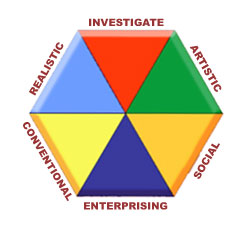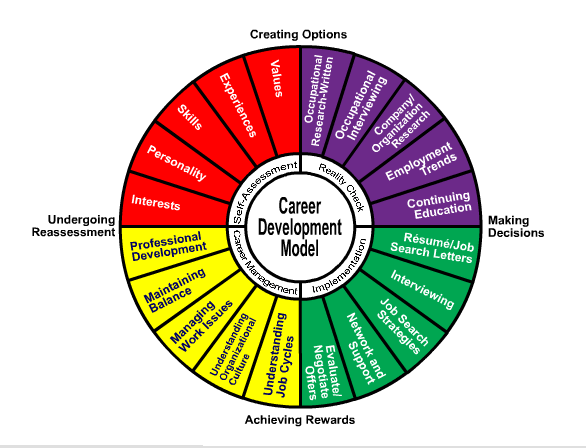Lesson 30: Finding Occupation and Finding Vocation
Attention

One of the more popular theories as to why people choose to go into specific professions is Holland's Theory
This theory is based on personality types and how our personalites attract us to specific occupations. This is also applied to leisure activites!
Learning Outcomes
Upon completion of this lesson's material, students will be able to:
- Reflect on your personal career choices and the reasons for these choices
Teaching
As is noted in the title of this chapter, here we are talking about Occupation and Lifestyle. Two very major issues relevant to Erikson's age of Generativity (typically mid-life, but we encounter these decisions through young adulthood as well)
Work
In my Sociology class we talk about Status and Roles in society. The Status (in Sociology) is the "Job Title" while the Role (in Sociology) is the "Job Description".
We all have multiple "Statuses" and each has a "Role" or job description...it is "what we do". It is a HUGE part of our identity in this culture. In fact, when you meet someone what is the first question you ask after you have their name (at least most of the time)....?
"What do you do?"
The importance of the decisions we make about "what we do" (either work or play/leisure) are critical in how we see ourselves (identity) and how others see us (social status).
Career Development Model
Another model sees Career Development as cyclical...the graphic below represents the steps individuals take in getting into new careers. This model is particularly important as we realize that many people have multiple careers in their lives.

Keep in mind we may go through this process many times throughout our careers!
Hollands Theory of Work Environments
The Holland theory of Career Development focuses on a match between personality, aptitude, and work environments. The theory describes 6 basic types of work environment.
Realistic Type Work Environment
Persons having a Realistic personality type "dominate" this environment. There are more of them than there are people of other personality types. For example, at a construction site there will be more persons having a "Realistic" personality than there will be people who have a Social or Artistic type.
"Realistic" people create a "Realistic" environment. For example, they particularly value people who are practical and mechanical -- who are good at working with tools, mechanical or electrical drawings, machines, or animals.
Examples of occupations that have a Realistic environment are:
| Farmer | Forester |
Fire Fighter |
Police Officer |
Flight Engineer |
Pilot |
Carpenter |
Electrician |
Diesel Mechanic |
Locomotive Engineer |
Truck Driver |
Locksmith |
Investigative Type Work Environment
Persons having an Investigative personality type "dominate" this environment. There are more of them than there are people of other personality types. For example, in a scientific laboratory there will be more persons having an "Investigative" personality than there will be people who have an Enterprising type.
"Investigative" people create a "Investigative" environment. For example, they particularly value people who are precise, scientific, and intellectual -- who are good at understanding and solving science and math problems.
Examples of occupations that have an Investigative environment are:
| Chemist | Mathematician |
Meteorologist |
Biologist |
Dentist |
Physician |
Veterinarian |
Pharmacist |
Medical Technician |
Architect |
Surveyor |
Electrical Technician |
Artistic Type Work Environment
Persons having an Artistic personality type "dominate" this environment. There are more of them than there are people of other personality types. For example, among a group of professional musicians there will be more persons of an "Artistic" personality than there will be people who have a Conventional type.
"Artistic" people create an "Artistic" environment. For example, they particularly value people who are expressive, original, and independent -- who have good artistic abilities in creative writing, drama, crafts, music, or art.
Examples of occupations that have an Artistic environment are:
| Dancer | Book Editor |
Art Teacher |
Clothes Designer |
Graphic Designer |
Comedian |
Actor |
Disk Jockey |
|
Composer |
Musician |
|
Social Type Work Environment
Persons having a Social personality type "dominate" this environment. There are more of them than there are people of other personality types. For example, in a hospital, school, or counseling service there will be more persons having a "Social" personality than there will be people who have a Realistic type.
"Social" people create an "Social" environment. For example, they particularly value people who are helpful, friendly, and trustworthy -- who are good at good at teaching, counseling, nursing, giving information, and solving social problems.
Examples of occupations that have a Social environment are:
| Counselor | Parole Officer |
Social Worker |
Dental Hygienist |
Nurse |
Physical Therapist |
Teacher |
Librarian |
Athletic Trainer |
Enterprising Type Work Environment
Persons having an Enterprising personality type "dominate" this environment. There are more of them than there are people of other personality types. For example, in a business or legal setting there will be more persons having an "Enterprising" personality than there will be people who have a Investigative type.
"Enterprising" people create an "Enterprising" environment. For example, they particularly value people who are energetic, ambitious, and sociable -- who are good at politics, leading people and selling things or ideas.
Examples of occupations that have a Enterprising environment are:
| Auctioneer | Sales Person |
Travel Agent |
Recreation Leader |
Judge |
Lawyer |
City Manager |
Sales Manager |
Bank President |
TV Newscaster |
Customs Inspector |
Camp Director |
Hotel Manager |
Real Estate Agent |
School Principal |
Conventional Type Work Environment
Persons having a Conventional personality type "dominate" this environment. There are more of them than there are people of other personality types. For example, in an office of a bank or real estate company there will be more persons having a "Conventional" personality than there will be people who have a Artistic type.
"Conventional" people create an "Conventional" environment. For example, they particularly value people who are orderly, and good at following a set plan -- good at working with written records and numbers in a systematic, orderly way.
Examples of occupations that have a Conventional environment are:
| Court Clerk | Secretary |
Bookkeeper |
Bank Teller |
Post Office Clerk |
Mail Carrier |
Typist |
Title Examiner |
Timekeeper |
Work in the Lifespan
Consider the following issues and topics related to career and human development:
- Expectations of others (consider the concept of Marcia's Identity Foreclosure)
- Gender Expectations (what is considered women's work and men's work...just go to a KVCC graduation and note the differences!)
- Job Satisfaction
- Economic Changes (consider that factory closures and economic changes may force people to make changes that they SHOULD make but would otherwise be reluctant to make.)
- Alienation and Burnout
Work and Family
Remember what I said earlier about Role and Status? Consider what happens when you have one status (your job) and another status (your relationship) and another status (your a parent)...is it possible to see that sometimes the various "job descriptions" will conflict with each other? :-)
This is called "Role Conflict"...when it effects us negatively and we feel pain it is called "Role Strain". With more and more folks doing more and more things there is a raised risk of Role Strain and Role Conflict. These are major sources of stress in our lives.
Managing Role Strain with good time management skills, scheduling relaxation time, scheduling important family time, and saying "Yes" and "No" in an intelligent way is a key to leading a happy life.
Assessment

Lesson 30 Assignment
- Complete the Holland and/or Myers Briggs tests listed below, report your results and how they line up (or don't line up) with your current CAREER activities.
Here is an online version of the Holland Codes test developed at Rogue Community College.
http://www.roguecc.edu/counseling/HollandCodes/test.asp
Complete the Myers-Briggs test by completing the quiz at the site listed below:
http://www.humanmetrics.com/cgi-win/jtypes2.asp
Then, analyze your results utilizing the information found on personalitypage.com
http://www.personalitypage.com/careers.html